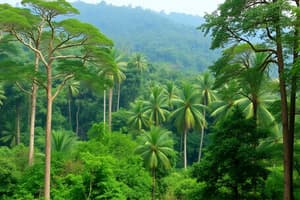Podcast
Questions and Answers
What were the primary drivers of deforestation under colonial rule in regions like India?
What were the primary drivers of deforestation under colonial rule in regions like India?
Population growth, expansion of cultivation for food and taxes
How did the British Empire contribute to the surge in deforestation during colonial rule?
How did the British Empire contribute to the surge in deforestation during colonial rule?
Encouragement of commercial cropping, division of forests into reserves prioritizing commercial interests
What were the environmental impacts of increased deforestation under colonial rule?
What were the environmental impacts of increased deforestation under colonial rule?
Habitat loss, disrupted ecosystem services, accelerating climate change impacts
How did colonizers view forests until mid-century during colonial rule?
How did colonizers view forests until mid-century during colonial rule?
Why were forests divided into reserves, protected, and village zones under colonial rule?
Why were forests divided into reserves, protected, and village zones under colonial rule?
What were the main reasons behind the introduction of plantation systems under colonial rule?
What were the main reasons behind the introduction of plantation systems under colonial rule?
What role did Dietrich Brandis play in forest management in India during the 19th century?
What role did Dietrich Brandis play in forest management in India during the 19th century?
How did advances in scientific forestry impact people who relied on forests for subsistence activities?
How did advances in scientific forestry impact people who relied on forests for subsistence activities?
What were the consequences of colonial powers establishing large-scale plantations for export purposes?
What were the consequences of colonial powers establishing large-scale plantations for export purposes?
How did colonial forest reserves impact forest-dwelling populations?
How did colonial forest reserves impact forest-dwelling populations?
What legacies of colonial rule continue to influence contemporary debates on sustainable forest use?
What legacies of colonial rule continue to influence contemporary debates on sustainable forest use?
What principles do contemporary forest governance models aim to be grounded in?
What principles do contemporary forest governance models aim to be grounded in?
Flashcards are hidden until you start studying
Study Notes
The Forest Society and Colonial Interactions: An Overview of Environmental Consequences, Deforestation, and Plantation Practices
The dawn of colonial rule in regions like India and beyond marked a transformative era for forests and their societal connections. This period saw a shift towards systematic deforestation and the introduction of plantation systems driven by global markets' demands and colonial policies aimed at resource extraction rather than ecological balance and sustainability.
Deforestation
Deforestation surged under colonial rule, becoming increasingly organized and comprehensive in countries like India. Population growth intensified pressures on forestland, driving farmers to clear woodlands to expand cultivation amid rising demands for food and taxes. The British Empire supported this trend through encouragement of commercial cropping and the division of forests into reserves, protected, and village zones benefiting colonial industries, with reserved forests prioritizing commercial interests.
Environmental Impacts
Colonizers' viewpoints considered forests largely as unproductive wilderness until mid-century, while their destruction for colonial gains added to the perception that forests were mere assets to be exploited for profit. Increased deforestation resulted in habitat loss, disrupted ecosystem services, and accelerating climate change impacts partially attributable to today's environmental challenges.
Forest Laws and Management
Germany's Dietrich Brandis served as the first Inspector General of Forests in India during the 19th century, initiating efforts to manage forests responsibly and legally sanctioning forest governance through institutions such as the Indian Forest Service founded in 1864. Advances in scientific forestry contributed to restrictions on forest use—both legally and culturally—by peoples previously accustomed to utilizing forests for subsistence activities.
Plantation Systems
Colonial powers seized opportunities presented by emerging export markets, transforming native landscapes into large-scale plantations producing goods like coffee, tea, and rubber. European planners received vast tracts of land at low cost, marginalizing traditional land users and compounding local conflicts over resource access. Simultaneously, forest reserves were expanded to benefit colonial commerce, further displacing forest-dwelling populations.
Despite post-Independence shifts in policy priorities, legacies of colonial rule continue to shape contemporary debates regarding sustainable forest use and community stewardship. Today, globally diverse perspectives converge to promote inclusive, equitable forest governance models deeply grounded in cultural sensitivity, environmental responsibility, and socioeconomic justice principles.
Studying That Suits You
Use AI to generate personalized quizzes and flashcards to suit your learning preferences.




